Welcome to Tehran, Iran! This vibrant city, located at the base of the Alborz mountain range in northern Iran, is a hotbed of culture and history in the Middle East. But it’s also an incredible place to explore gastronomy. Iranian cuisine is a beautiful fusion of rich Persian flavors, as well as scintillating influences from Central Asia and the Levant. From juicy kebabs to aromatic stews and exotic meat dishes, we’ll explore the best food this city has to offer.
As you explore the bustling streets and charming eateries of Tehran, you will find some of Persia’s most exquisite dishes. From saffron-infused favorites like tahchin and loghmeh to hearty ghormeh sabzi and Fesenjan to juicy kubideh and kale pache, every bite is an explosion of flavors.
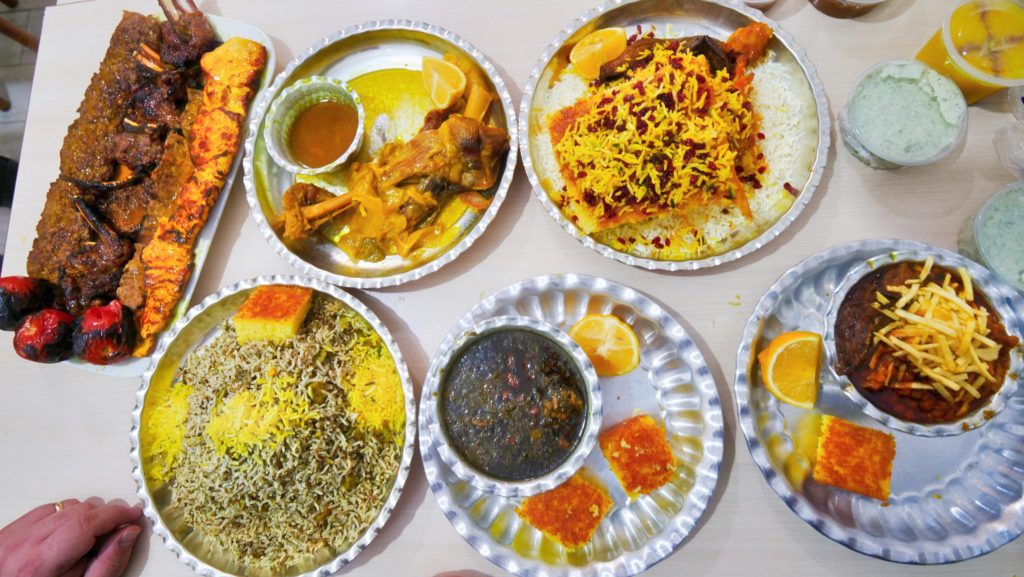
I had the pleasure of exploring Tehran’s food scene in June of 2022 with my friends at Kootook Travel and the one and only Mr. Taster. While I was there, I witnessed not only Iran’s underrated cuisine, but also the warmth and hospitality of the Iranian people. In this Tehran food guide, we’re exploring both, highlighting my favorite dishes as we go. Let’s dive into the gastronomic wonders of Tehran, Iran!
Kale Pache is a traditional Iranian favorite that exemplifies the heartiness of Persian cuisine. This flavorful dish consists of meats from a sheep’s head, including the brain, eyes, tongue, and hooves, in a rich and savory broth. This unique combination of ingredients gives the dish its distinct, earthy taste and texture.

Kale Pache is popular at breakfast and late at night, especially during the colder months. It is typically served with fresh bread, herbs, and a squeeze of lemon juice for added tanginess.

This unbelievable dish was the first I tried upon arriving in Tehran, Iran. Not only did I enjoy the hearty head meat at my table, but the friendly cook fed me several pieces as he prepared it! The dish may seem exotic to Westerners, but I say don’t knock it ‘til you try it. It’s probably my favorite dish of the entire trip. I couldn’t get enough of it!
Barbari bread is a traditional Iranian flatbread. It typically has an oval shape and a blistered and crispy crust. Traditional Barbari bread bakes in a clay tandoor oven or on hot pebbles or stones. The result is a bread with a soft and chewy interior, complemented by a golden and slightly charred exterior.
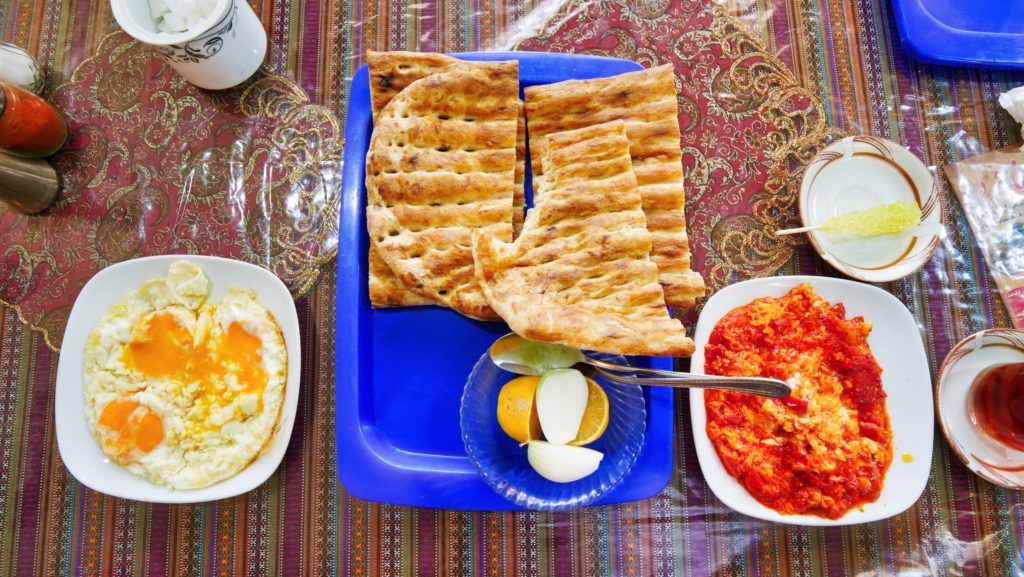
Barbari bread is a staple in Iranian cuisine and is often enjoyed with many dishes, including meats, stews, and even honey. I ate it at practically every meal in Tehran, Iran. And while I’m not usually a huge bread person, I absolutely loved its smoky flavor and chewy, crispy texture. It’s a must when in Tehran!
As you’re exploring the street markets and restaurants of Tehran, you’d be hard-pressed to not come across a drink called tokhme sharbati. Tokhme sharbati is a refreshing and nutritious Iranian drink made with chia seeds, water, sugar, rose water, and lemon juice. Also known as sharbat-e tokhme sharbati, it’s famous locally for its cooling properties and health benefits.

The chia seeds are a good source of antioxidants and are help improve hydration. It’s best to drink it cold, making it a perfect choice for hot summer days. I loved trying this drink, not only for its health benefits, but also because of its floral flavor and thick consistency!
One of my favorite Persian foods I’ve ever tried, tahchin is a traditional Iranian rice dish. that is both delicious and visually appealing. It is a savory rice cake containing fragrant basmati rice, yogurt, saffron, and chicken or meat. The rice is cooked with a mixture of ingredients, including eggs and spices, until it forms a golden crust on the bottom.
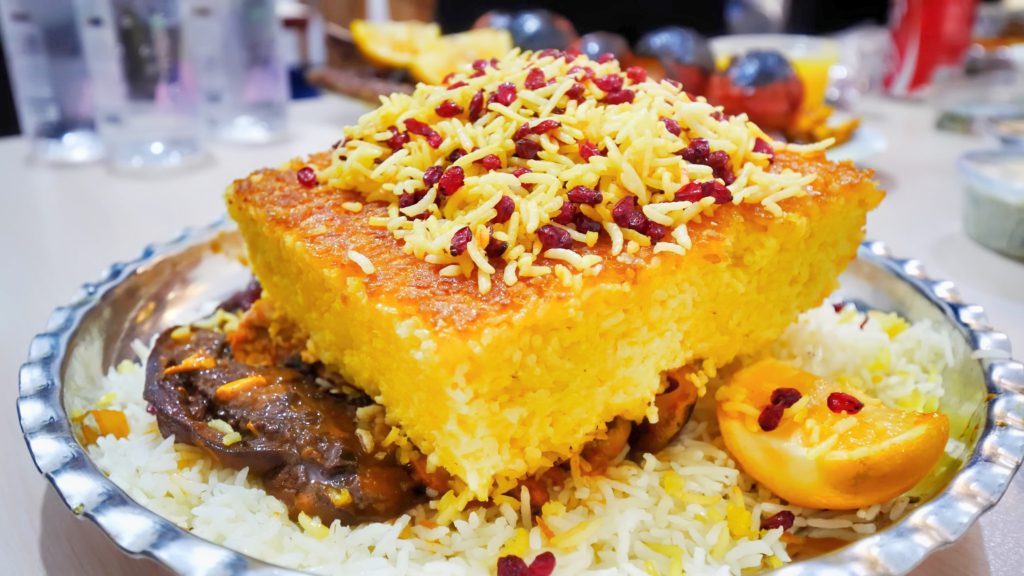
The cooks then flip the dish upside down to reveal the crispy, caramelized rice layer on top. The cook often garnishes it with barberries, almonds, or pistachios. The different textures of the rice, combined with the tangy yogurt, floral saffron, and litany of spices, makes it a must in Tehran, Iran!
One of the most common dishes I came across throughout Tehran, Iran is a savory Persian stew called ghormeh sabzi. It contains a diced lamb or beef and kidney beans, along with combination of spices and herbs, including parsley, cilantro, fenugreek, and leeks. The sautéed herbs create a rich and earthy base for the stew. Then, a bit of dried adds a tangy flavor.

This hearty and comforting dish often comes with saffron-infused rice, providing a perfect balance of flavors. It’s amazing by itself, but even better with some traditional bread. Not only will ghormeh sabzi leave your taste buds craving more, but it’s also a true representation of Iran’s culinary heritage.
Across the Middle East and South Asia, you’ll come across a number of rice dishes with similar names: polow, pilaf, and pulau. One of these, bogali polow, is a delicious Persian dish that adds herbs, meat, and dried fruit. This aromatic dish layers fragrant basmati rice with a mixture of sautéed onions, garlic, dill, parsley, coriander.

Tender pieces of meat (usually lamb or chicken), round out the dish with dried fruits like raisins or barberries. Toasted almonds or pistachios top the polow, adding a crunchy element that adds more texture to an already fantastic dish.
Sholeh Zard is a classic Persian dessert that is popular across Iran. This sweet rice pudding contains saffron, cardamom, and rosewater and is popular on special occasions. It has a creamy, rich texture, and is a favorite both warm or cold.

The dish contains just a few simple ingredients, but the combination of flavors creates an unmatched flavor you can’t resist. If you’re looking to try out a traditional Iranian dessert in Tehran, Iran, Sholeh Zard is definitely worth a try!
One of my favorite dishes in Tehran, Iran is loghmeh, a traditional Iranian dish that combines grilled kebabs with a flavorful tomato-based sauce. The dish involves marinating ground beef with spices and herbs, grilling it, and then adding the tomato-based sauce, onions, garlic, and other spices.
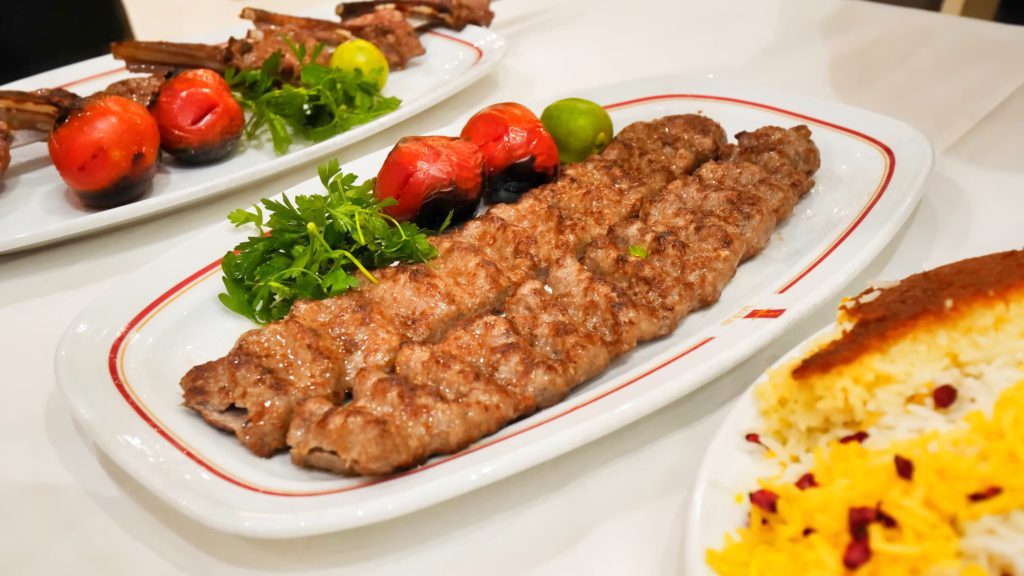
Loghmeh kebab, another traditional Persian dish, consists of minced beef, lamb, or chicken mixed with spices and herbs. It often coes with Persian flatbread and various vegetables and sauces. You can eat it by itself, but it often comes as part of a larger meal with rice or salad. It had my mouth watering every time I had it—it’s a must!
Iran gets very hot, and when you’re exploring Tehran’s food scene, you’ll need something cool and refreshing to keep you going. I recommend doogh. Doogh is a popular Iranian drink containing yogurt, water, and mint, giving it a nice, herbal flavor.
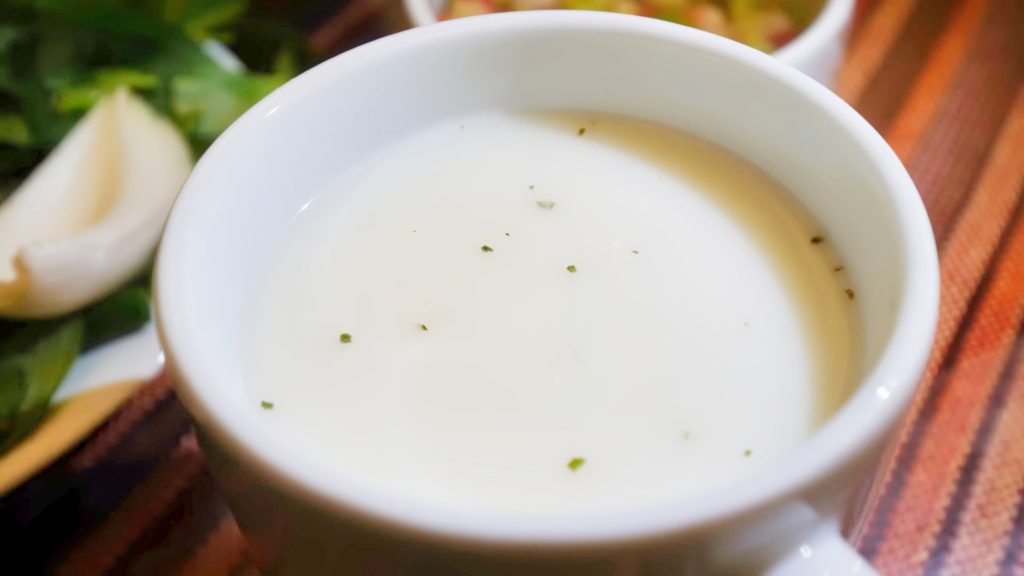
Not only is it great for its cooling properties, it’s also good for coating your stomach! Doogh is popular at mealtimes, especially festive occasions. It may be an acquired taste for some, but its refreshing taste and cooling effect helped me out a lot while exploring Tehran, Iran!
Also known as abgoosht, dizi is a traditional Iranian lamb and chickpea stew that holds a prominent place in Persian cuisine. This drool-worthy dish is slow-cooked in a clay pot for several hours, allowing the flavors to meld together.
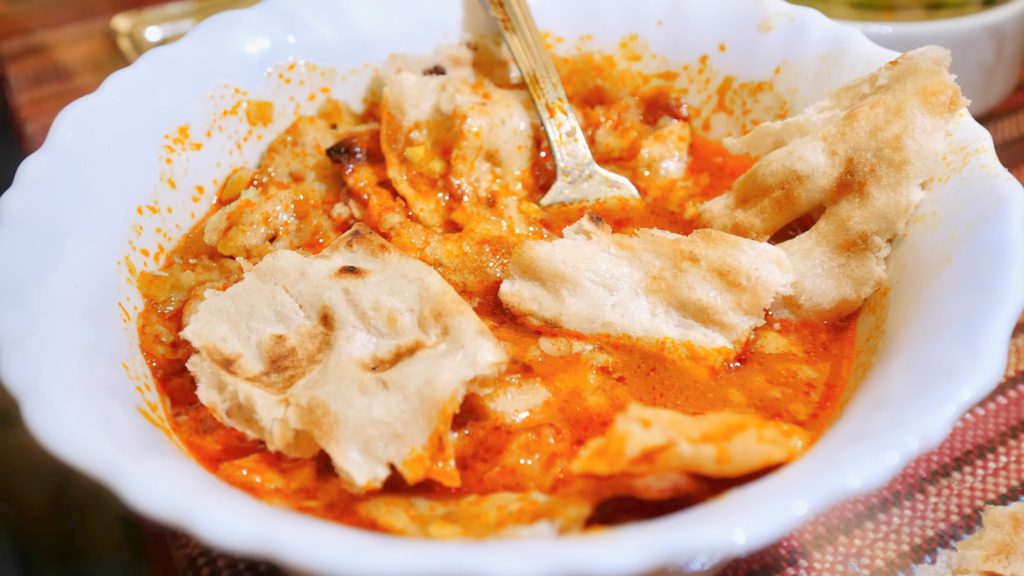
Dizi comes in two parts – the strained broth in a separate bowl, while the lamb, potatoes, tomatoes, chickpeas, and beans, come mashed together and served on the side. Dizi is a hearty, stick-to-your-ribs dish that’s another must in Tehran, Iran.

If you want, you can add onions, pickles, and yogurt to add a refreshing element to the heavy, pasty dish. I had mine with a delicious salad that balanced the hearty textures of the dish. It’s fantastic either way and definitely worth your time when you visit Tehran, Iran!
I’ve eaten versions of kebabs all over the world, from Ghana to Armenia to Iraq. But the Persian one called kubideh (also spelled koobideh) is easily one of my favorites. Kubideh is a massive kebab consisting of seasoned ground meat, typically lamb or beef. The meat usually contains grated onion, minced garlic, turmeric, cumin, and sumac.
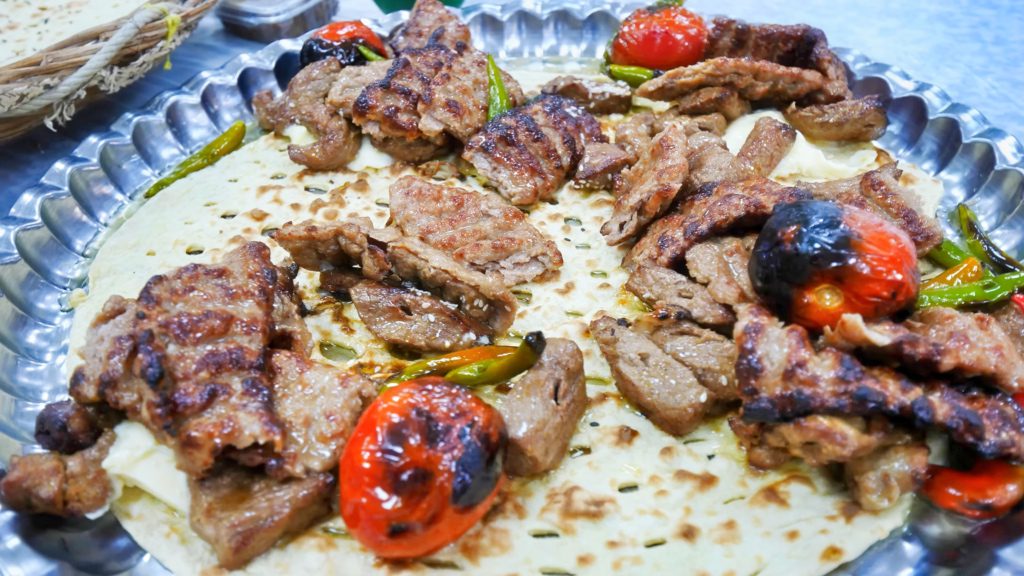
Traditionally, the cooks prepare the kubideh on skewers over an open flame. This allows the meat to become tender while developing a slightly charred and smoky exterior. Try it alongside saffron-infused rice, grilled tomatoes, and fresh herbs! It’s the perfect combination of juicy, tender, charred, and smoky, and makes my mouth water just thinking about it!
Now, on to something sweet! And while I don’t have much of a sweet tooth, I’ll make an exception for bamieh. This traditional Iranian pastry consists of small, elongated shapes, deep-fried until golden brown.
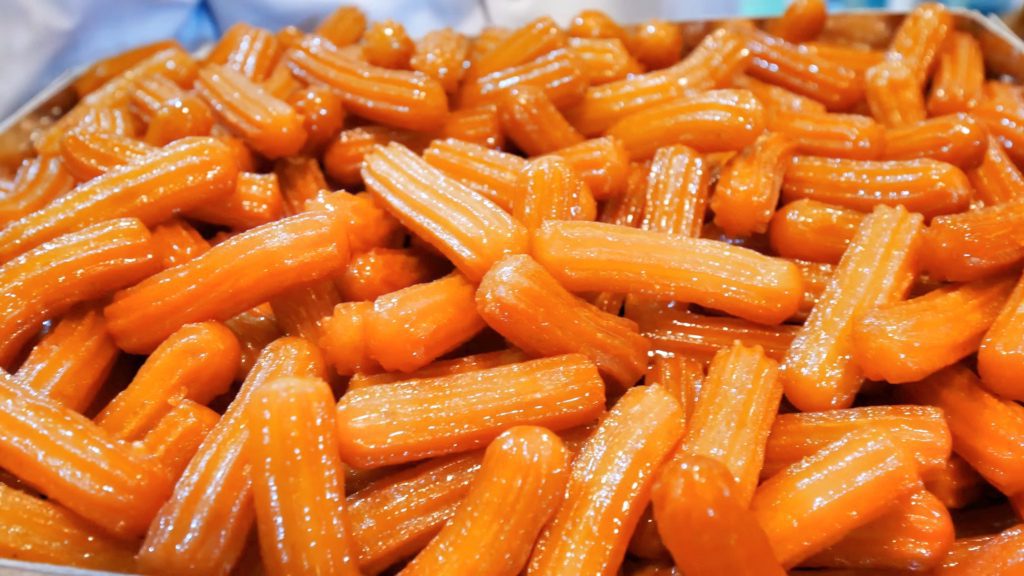
As a final touch, the cooks drizzle a syrup containing sugar, rosewater, and saffron over it. The final result is a crispy, sweet treat that goes well with a cup of Irani chai or coffee. Try it when a sweet craving strikes you while exploring Tehran, Iran!
While Tehran, Iran may often be in the news for negative reasons, there’s much more to this majestic city than that. The people are among the friendliest I’ve ever come across in my travels. Even more, the culture is fascinating, and the food scene is downright phenomenal.

Whether you’re a fan of savory stews like dizi, hearty kebabs like kubideh, or rice dishes like tahchin, you’re in for a treat. Persian food is a sensational symphony of flavors that work in perfect harmony with each other. Book a trip to Tehran, Iran today to experience it for yourself!
Counter
101 Countries • 1432 Cities